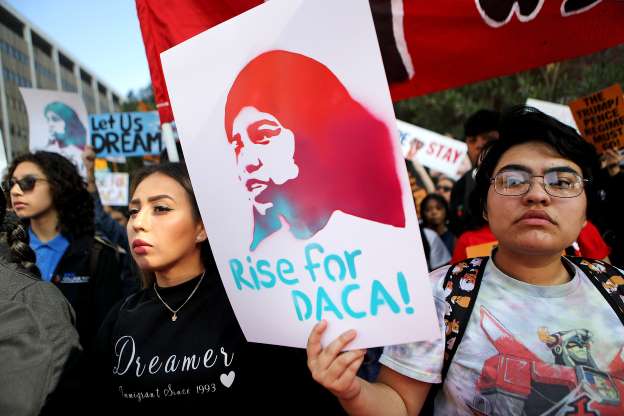U.S. Supreme Court to decide on case addressing end of DACA program

More stories from Marianne Salas
On Nov. 12, the Supreme Court of the United States heard oral arguments concerning the legality of the procedure followed by the Trump administration in ending the Deferred Action for Childhood Arrivals. Their decision, expected to be released next June, will affect the futures of approximately 700,000 DACA recipients.
First announced in 2012 by then President Barack Obama, DACA is an initiative intended to temporarily delay the deportation of undocumented immigrants who were brought into the United States as children.
If eligible, the program grants recipients a work permit and the ability to renew their status following two years. DACA recipients must meet certain criteria such as never having been convicted of a felony or certain misdemeanors and must currently be studying or have graduated from high school, among others.
Laura Gutierrez-Spencer, Ph.D., Director of the Chicano Programs at New Mexico State University, elaborated on the types of people DACA is meant to protect.
“They’ve contributed to this country in so many ways. They’ve built careers and families here. They’re good citizens and they have to be in order to qualify,” Gutierrez-Spencer said.
Gutierrez-Spencer also discussed the implications for DACA recipients if the Trump administration were to continue the process of ending DACA.
“They did not make the decision to come to this country. They were brought at a very young age by their parents and their lives could be in complete disarray if they were to lose their status. They would be left exposed, with the government knowing who they are and where they live,” Gutierrez-Spencer said.
According to the National Immigration Law Center, several lawsuits were filed in response to the Trump administration’s phasing out of DACA in September 2017.
The lawsuits, merged into the Department of Homeland Security v. Regents of the University of California, challenge the lawfulness of the procedure followed by the Trump administration in ending DACA.
In a brief filed to the Supreme Court, the Department of Homeland Security provided several reasons for the recision of DACA.
They claim that because of the decision made in Texas v. United States in 2016 — a case that deemed the Deferred Action for Parents of Americans, an extension of DACA, as unconstitutional — they believed a similar result would occur if a case regarding DACA were to approach the Supreme Court.
The New York Times reports that during oral arguments last Tuesday, the Supreme Court’s conservative members “appeared ready” to rule in favor of the Trump administration. Since Associate Justice Brett Kavanaugh’s appointment in 2018, the Supreme Court now holds a conservative majority.
Sen. Tom Udall issued a press release on Nov. 12 in response to the case’s presentation of oral arguments, urging Republican lawmakers in Washington to demonstrate their support of developing a solution to DACA.
“It is past time they deliver real action—not just empty words—to these young Americans who deserve protection, and stop using them as pawns to be traded for other unpopular policies,” Udall said.
Annie Quintana-Eddins, an NMSU junior majoring in Geography with a minor in Government, said that political attitudes toward immigrants have become more negative in recent years.
“I think it’s a real shame, especially when it comes to DACA recipients. They are students and contributing members of our society,” Quintana-Eddins said.
When asked about President Trump’s recent tweet about DACA recipients, in which he labels them “hardened criminals,” Quintana-Eddins said that he has been very back and forth with his rhetoric.
“He’s playing with people’s futures and it’s not good. I really think that people should be able to see that this is not okay,” Quintana-Eddins said.

Marianne Salas is a senior at NMSU pursuing a double-major in English and Government with a supplementary major in Law & Society. She will be attending...

